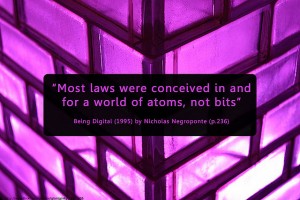 tenet — a principle or belief
tenet — a principle or belief
Having worked in libraries my entire adult life (I began by volunteering at 17), I’ve seen a lot of technology come and go. I like to say that I’ve forgotten more library technology than most young librarians know. And mostly I’m happy about that. If an acoustic coupler modem never again darkens my door, color me happy.
But along with all of that time on the road comes lessons learned. Opinions formed and solidified. Perhaps even calcified. So I’ve decided it’s time to dump a few of mine on my largely unsuspecting (and admittedly tiny) readership.
- Every technology can be improved upon or superseded. Toilet paper seems to be a technology that has reached a logical peak, but even there I’m not sure it can’t be improved upon. Just don’t ask me how.
- When adopting a new technology, neither an early adopter nor laggard be. Of course there are exceptions, or else we wouldn’t have early adopters, and there are those who aren’t paying attention, or else we wouldn’t have laggards. But generally speaking, you and your organization is going to want to implement a new technology after it has been tested and improved but before it’s virtually on its way out.
- The pace of technological change is inconsistent and unreliable. We tend to think about progress as advancing at a relatively constant pace, with new things happening all the time. Actually, technological change comes in fits and starts, punctuated by significant pauses in innovation. I happen to think we are in one of those pauses now, having made it through the revolutionary early days of the Internet and the web.
- A technology that solves a problem sufficiently will tend to stagnate. How much has the simple pencil evolved? Not much, in recent decades.
- A stagnant technology is one that is ripe for disruption. Just look at the vacuum cleaner, which went relatively unchanged for decades until Dyson came along and decided to accomplish the task in a completely new way. Then the entire rest of the market followed along, but they had been perfectly happy to sell us the same basic vacuum cleaner for years.
- The best technology cannot overcome the best marketing. Just look at VHS vs. Betamax. Betamax was considered the best technology, but VHS was rolled out more effectively. By “marketing” I’m including all of the various things you can do to encourage adoption, including the kind of consortium of organizations that helped VHS win the day.
- Your hardest problems are not technical, they’re political. If you’ve been working for longer than about a year this hardly needs explaining.
- This list is incomplete, not correct in every situation, and will change over time. Just like technology.
So sue me. Or better yet, argue with me in the comments. I can take it.
Image by Will Lion, Creative Commons BY-NC-ND 2.0


Hi Roy
Can’t disagree with anything you’ve said – but there is something I think you’ve missed that I’m sensing. You mentioned technology ‘fits and starts’ but even with those change has so far been largely incremental. We have a fixed set of things we want to do and we change/improve the technologies that allow us to do them.
I think/sense that a point is coming where what we to do will change (not just the way we do it). The Kurzweil singularity is hiding behind that rock – perhaps.
To draw an an analogy: once there was no free oxygen on Earth, but when photosynthesis evolved it led to a world completely different to that in which the photosynthesizers evolved and aerobic subsumed the anaerobic.
I’m guessing I’ll live to see that change – I just wonder how far off it will be before I recognise it for what it is.